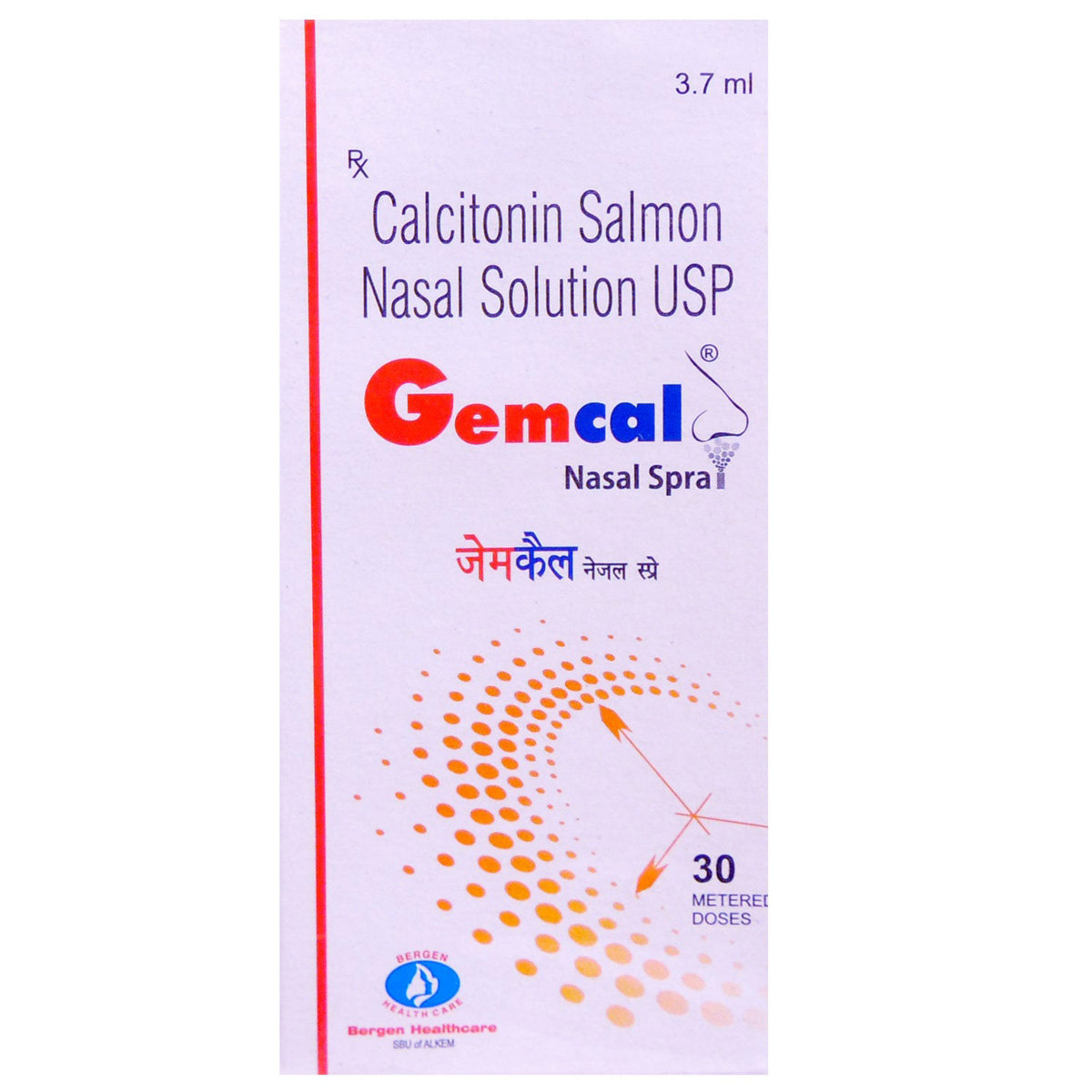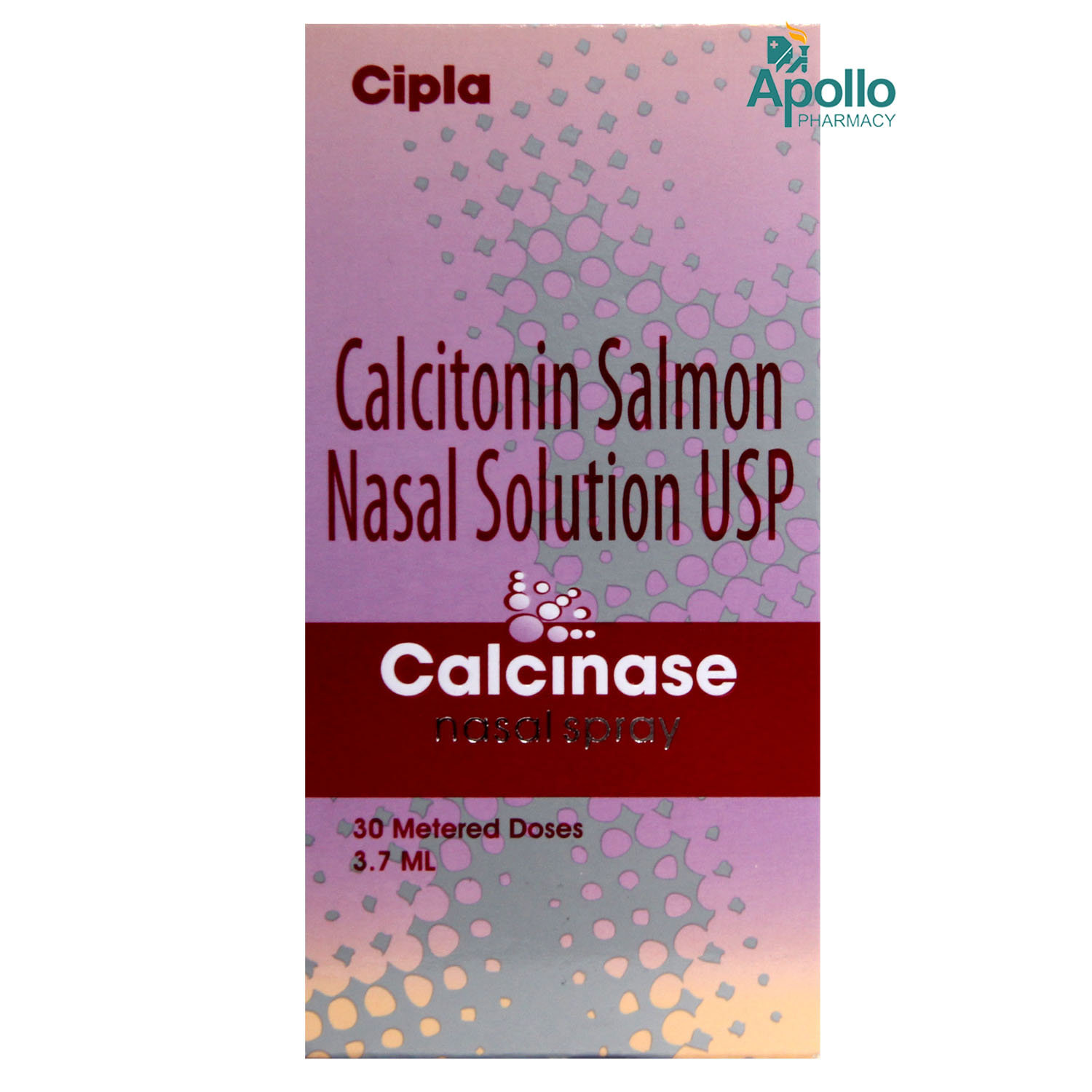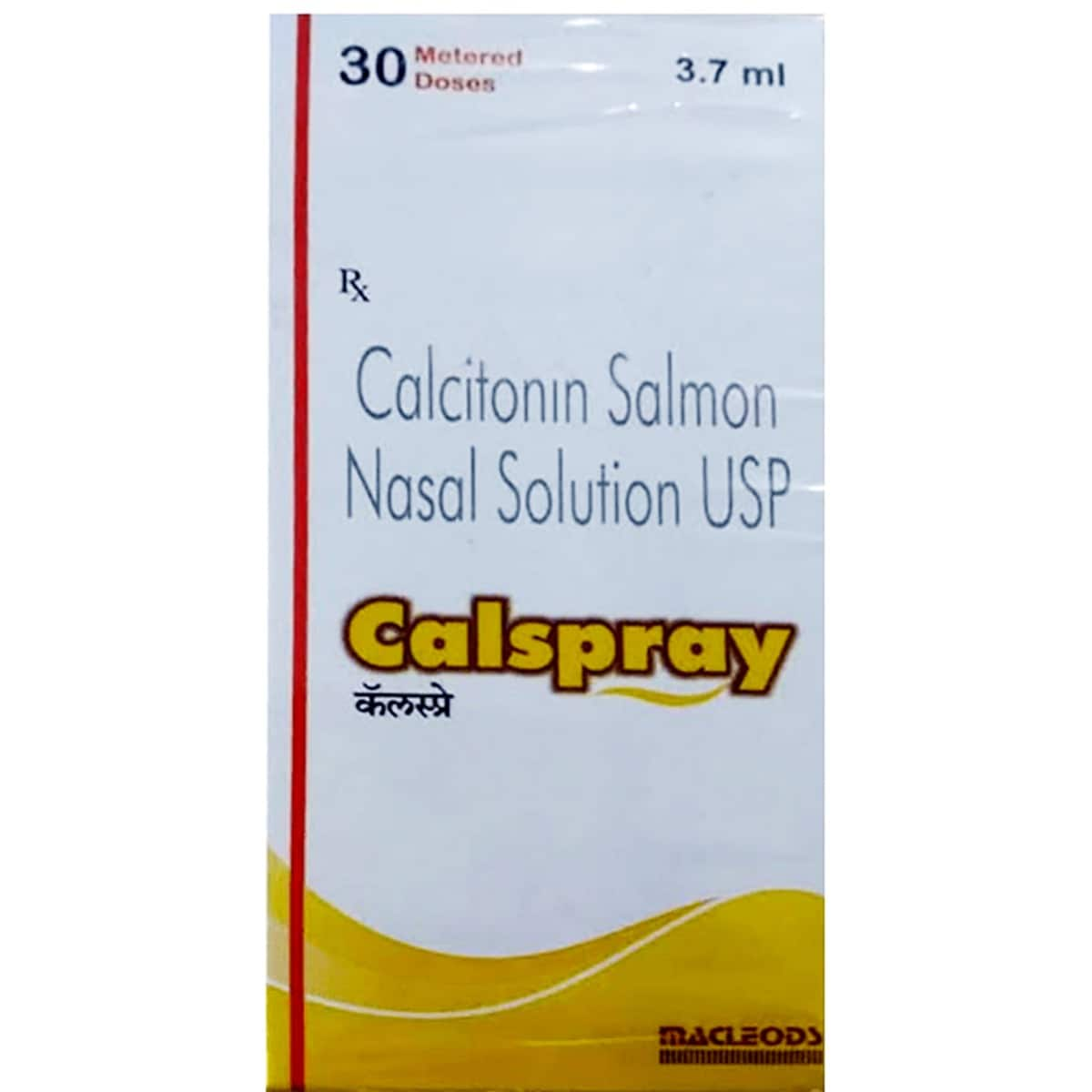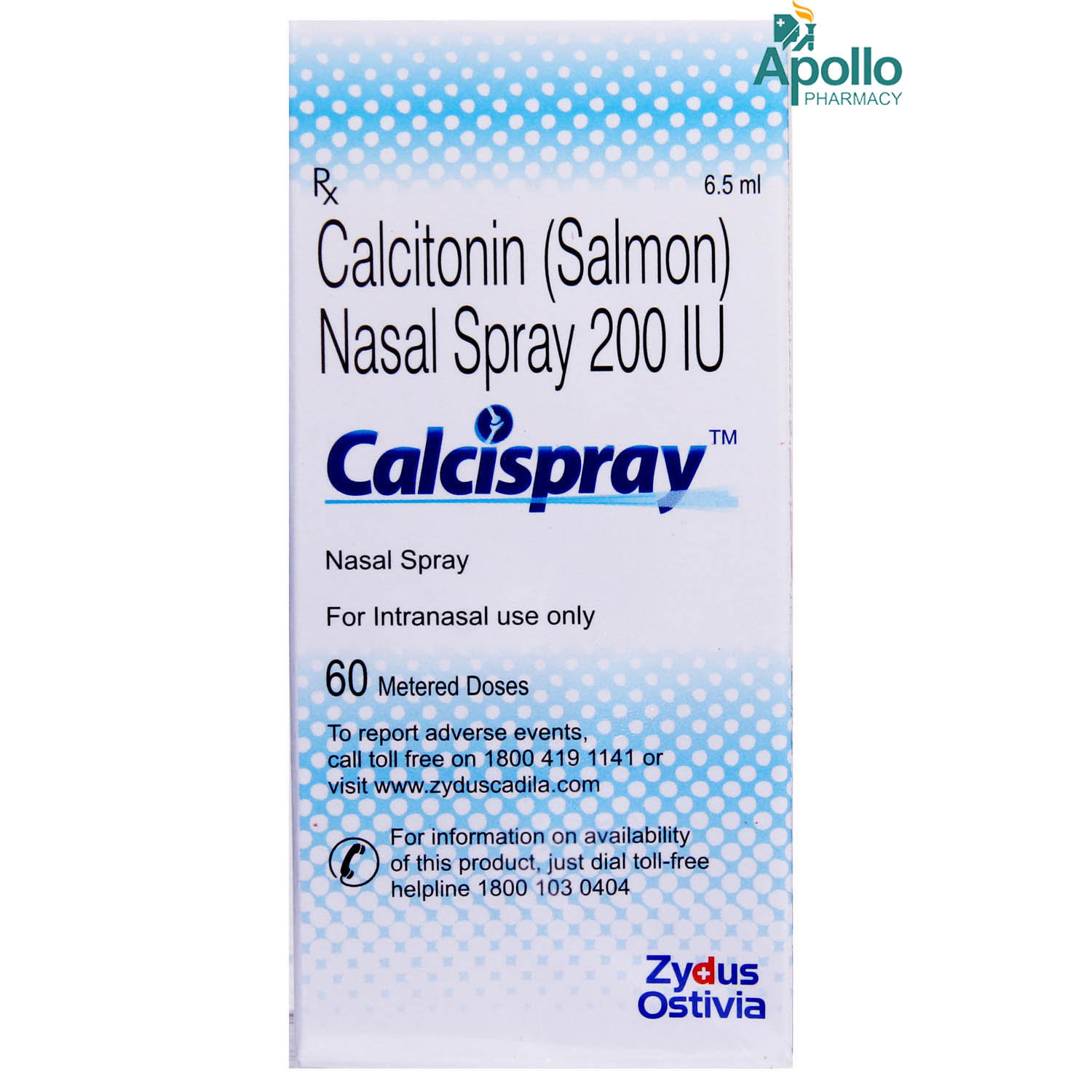Calcitonin
About Calcitonin
Calcitonin belongs to groups of medications called hypocalcemic agents, used to treat high blood calcium levels (hypercalcemia) and Postmenopausal Osteoporosis. Besides this, it can also help treat complications of Paget's disease. Hypercalcemia is a condition in which the calcium level in your blood is above normal. Postmenopausal osteoporosis is a medical condition that causes thinning and weakening of the bones during/after a menopausal period. Paget’s disease is a chronic disease of bone that disrupts the replacement of old bone tissue with new bone tissue, resulting in the new bone that is abnormally shaped, weak and brittle.
Calcitonin contains Calcitonin. It reduces the activity of osteoclasts, which are the cells responsible for bone breakdown. When bone is broken down, the calcium in the bone is released into the bloodstream. As a result, calcitonin's suppression of osteoclasts limits the quantity of calcium released into the blood. Furthermore, it can reduce calcium resorption in the kidneys, resulting in decreased blood calcium levels.
Calcitonin will be administered by a qualified healthcare professional. Kindly do not self-administer. In some cases, Calcitonin can cause side effects, including injection site reactions, nausea with or without vomiting and flushing of the face or hands. Most of these side effects of Calcitonin do not require medical attention and gradually resolve over time. However, if these side effects persist longer, please consult your doctor.
Before taking the Calcitonin, let your doctor know about all your medical conditions, sensitivities, and all medications you are using. And also, inform your doctor if you are pregnant, planning to become pregnant, or breastfeeding. Calcitonin should not be given to children as safety and efficacy have not been established.
Uses of Calcitonin
Medicinal Benefits
Calcitonin contains calcitonin, which belongs to groups of medications called hypocalcemic agents and is used to treat high blood calcium levels (hypercalcemia) and Postmenopausal Osteoporosis. On the other hand, it can also help people with Paget's disease of bone. Calcitonin reduces the activity of osteoclasts, which are the cells responsible for bone breakdown. When bone is broken down, the calcium in the bone is released into the bloodstream. As a result, calcitonin's suppression of osteoclasts limits the quantity of calcium released into the blood. Furthermore, it can reduce calcium resorption in the kidneys, decreasing blood calcium levels.
Directions for Use
Storage
Side Effects of Calcitonin
- Injection site reactions
- Nausea with or without vomiting
- Flushing of the face or hands
Drug Warnings
Before taking the Calcitonin, let your doctor know about all your medical conditions, sensitivities, and all medications you are using. And also, inform your doctor if you are pregnant, planning to become pregnant, or breastfeeding. Calcitonin should not be given to children as safety and efficacy have not been established. In rare situations, Calcitonin may cause major hypersensitivity reactions in individuals receiving Miacalcin injection, including bronchospasm, inflammation of the tongue or throat and anaphylactic shock. If you encounter any of these symptoms, contact your doctor right once.
Drug Interactions
Drug-Drug interactions: Calcitonin may interact with certain medicines used to treat mood disorders (e.g. lithium), medicines used to treat secondary hyperparathyroidism (e.g. etelcalcetide) and antiviral medications (e.g. foscarnet).
Drug-Food interactions: No interaction found.
Drug-Disease interactions: Calcitonin interacts with disease conditions, including hypocalcaemia (low calcium level) and mineral metabolism disorder.
Drug-Drug Interactions Checker List:
Safety Advice

Alcohol
cautionConsuming alcohol while on treatment with Calcitonin is not recommended since it may result in unpleasant side effects or make you more susceptible to the effects of alcohol.

Pregnancy
cautionCalcitonin should be used in pregnancy only when the benefit to the mother outweighs the risk to the foetus. Hence, inform your doctor if you are pregnant or expecting pregnancy.

Breast Feeding
cautionTell your doctor if you are a nursing mother before taking Calcitonin; your doctor will decide whether Calcitonin can be taken by breastfeeding mothers.

Driving
not applicableCalcitonin does not impact your ability to drive or operate machinery.

Liver
cautionInform your doctor before receiving the Calcitonin if you have a liver impairment. It should be used with caution in patients with liver conditions as it may alter liver functioning.

Kidney
cautionInform your doctor before receiving the Calcitonin if you have kidney impairment. Periodic examinations of urine sediment should be considered as this medicine may cause urine sediment abnormalities.

Children
cautionCalcitonin is not recommended for children as safety and effectiveness have not been established.
Habit Forming
Diet & Lifestyle Advise
- A person should consume calcium and vitamin D in their diet as it helps make stronger bones and avoid everyday osteoporosis dangers.
- A post-menopausal woman should limit salt intake as it can pose a high risk of losing more bone minerals than other women of the same age.
- Do regular exercise like weight-bearing exercises which are important for maintaining bone health.
- Calcium is important for making bones strong. Vitamin D is equally important, which helps to ensure the absorption and retention of calcium in bones, so take food high in calcium and vitamins.
Special Advise
- Certain diagnostic tests, like blood tests, measure the calcitonin level in your blood, and bone density scans are used to check bone mineral density (BMD).
- Clinical monitoring of serum electrolyte concentrations is recommended.
Patients Concern
Disease/Condition Glossary
Postmenopausal Osteoporosis: Postmenopausal Osteoporosis is a medical condition that causes thinning and weakening of the bones during/after a menopausal period. The chance of developing Osteoporosis (weak bone) is related to estrogen deficiency. During the menopausal period (45 years of age), the drop in estrogen leads to more bone resorption (osteoclasts; bone breakdown) than formation (osteoblast; new bone formation), resulting in Osteoporosis. In starting days, Osteoporosis does not show any symptoms. However, if proper treatment is not provided, it can lead to broken bones. Initially, the bones don't hurt, and breaks in the spine's bones may go unseen until they cause height loss. In Osteoporosis, bones can break at any time, even during daily activities like lifting or even from minor activities.
Paget's disease: Paget's disease is a chronic disease of bone that disrupts the replacement of old bone tissue with new bone tissue, resulting in the new bone that is abnormally shaped, weak and brittle. It most commonly occurs in the pelvis, skull, spine, and legs. Symptoms include bone pain, joint pain (especially in the back, hips, and knees), headache, enlargement and bowing of the thighs (femurs) and lower legs (tibias), and enlargement of the skull in the area of the forehead.
Hypercalcemia: Hypercalcemia is when the calcium level in the blood is higher than normal. Too much calcium in the blood can weaken the bones, create kidney stones, and interfere with working the heart and brain. It is usually a result of overactive parathyroid glands. Symptoms include increased thirst and urination, stomach pain, nausea, bone pain, muscle weakness, confusion and fatigue.
FAQs
Calcitonin contains Calcitonin. It reduces the activity of osteoclasts, which are the cells responsible for bone breakdown. When bone is broken down, the calcium in the bone is released into the bloodstream. As a result, calcitonin's suppression of osteoclasts limits the quantity of calcium released into the blood. Furthermore, it can reduce calcium resorption in the kidneys, resulting in decreased blood calcium levels.
If you have osteoporosis, avoid smoking, or try to quit. Smoking can reduce bone mineral density and increases the risk of fractures.
Calcitonin contains Calcitonin, a hormone that regulates the calcium level in the blood. This hormone helps in bone formation and also helps the body to reverse bone loss. Due to this, the number of cells that damages bones becomes comparatively less. Hence, the bone damage is halted. Using Calcitonin can increase bone formation by activation of the bone-forming cells.
Persons whose age is more than 45 years have low estrogen levels, females reaching menopause, too much consumption of alcohol, tobacco or caffeine, use of glucocorticoids and lack of calcium and vitamin D in foods are some of the factors that can increase the risk of osteoporosis.
Yes, Calcitonin is used together with calcium and vitamin D to treat bone loss in women with postmenopausal osteoporosis who have been postmenopausal for at least five years. Calcitonin inhibits the function of osteoclasts (bone breakdown), reducing bone resorption; thus, combining calcium and calcitonin could result in a positive bone balance.








